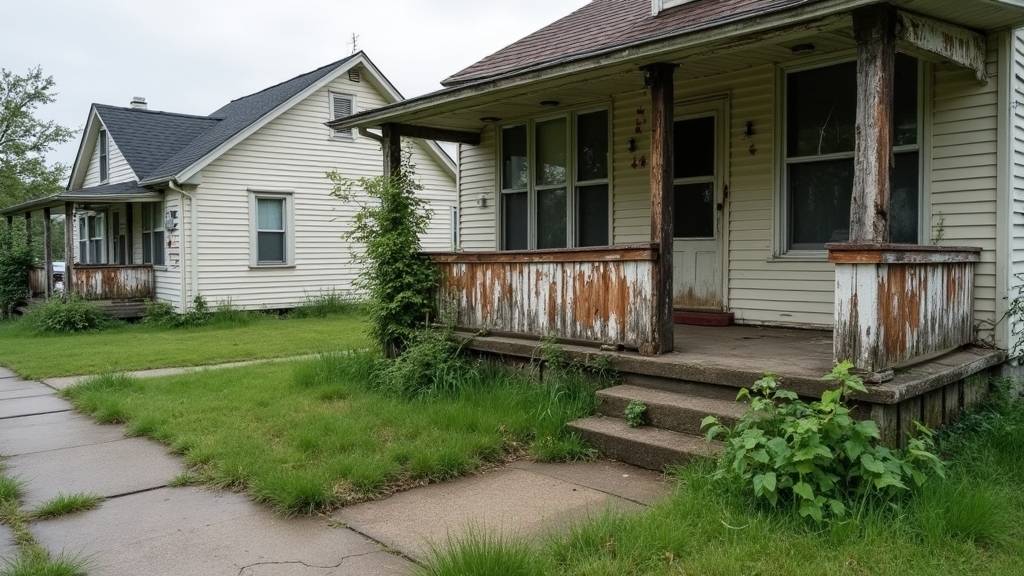When selling your home, title issues can cause serious problems. Unpaid taxes, old liens, or boundary disputes may delay the sale. These surprises often appear during the title search and can stop your deal.
These problems make buyers nervous and can ruin your plans. Delays can cost you time and money. Worse, some buyers might walk away because of unresolved title issues.
The most common title issues that can hurt your home sale include unpaid taxes, outstanding liens, and property line disputes.
You can solve many of these problems by finding them early and working with a good title company. Taking action now can save you from headaches later.This blog will help you spot and fix title issues before they threaten your home sale.
Key Takeaways
- Unpaid taxes, mortgages, or liens can cloud the title and block the sale until resolved.
- Boundary disputes and survey discrepancies can delay or prevent property transfers.
- Easements and right-of-way issues may limit property use and deter buyers.
- Clerical errors or missing heirs in public records can complicate ownership and cause legal delays.
- Fraudulent documents or hidden encumbrances threaten title clarity and sale completion.
Unpaid Property Taxes

Unpaid property taxes can stop you from getting a clear title when selling your home. A title company will always check for unpaid taxes. If you owe taxes, a lien is placed on your property. Unpaid property taxes can prevent you from selling your home by blocking a clear title and triggering a tax lien.
This tax lien usually has priority over other claims. You must pay off any outstanding taxes before the sale can close. Failing to do so can delay or even cancel the sale.
You should check your tax status with the local tax assessor’s office. If you request a payoff statement, you will know the total amount owed. This statement includes all penalties and interest. Understanding the legal implications of unpaid taxes can help you avoid complications during the sale.
If you pay off your taxes early, you avoid last-minute problems. Even a small unpaid amount can cause issues at closing. Make sure to address any tax debts as soon as possible. Properly resolving tax liens and understanding their payment priority ensures a smoother sale process.
Outstanding Mortgages
You need to watch for outstanding mortgages, especially unreleased mortgage liens, when reviewing a property’s title. If the lender hasn’t properly recorded a release, the lien remains, complicating your closing. Always verify payoff statements for accuracy to prevent costly errors or delays.
Additionally, ensuring that all legal documents are correctly processed can help avoid probate-related complications during the sale. Working with trusted title companies can streamline the process and confirm that all title issues are thoroughly addressed before finalizing the transaction.
Unreleased Mortgage Liens
Unreleased mortgage liens make property sales difficult. If a mortgage is not officially released, it still appears on the property title. Buyers and lenders then treat the lien as active, even if the loan is paid.
Title companies and lenders need all liens cleared before closing a sale. An unreleased lien can cause delays or even stop the transaction. If you want to avoid problems, you must ensure the lender records the mortgage release.
Always ask your lender for written proof when you pay off your loan. You should also check public records to confirm the lien is released. If you resolve any unreleased liens quickly, your sale will go more smoothly.
Payoff Statement Errors
Payoff statement errors often disrupt real estate closings. These mistakes can delay, or even stop, a property sale. Lenders sometimes give payoff statements with wrong amounts or missing fees.
A lender might miscalculate interest or leave out charges. If the mortgage is not fully paid at closing, the lien stays on the property. This creates title issues and possible future disputes.
Title insurance sometimes covers losses from payoff mistakes. However, it does not replace careful review by you or your agent. Always check payoff statements for accuracy before closing.
If you work with your settlement agent or attorney, they can help verify all amounts. Quick communication with lenders reduces the risk of errors. If you spot a mistake early, you can fix it before closing.
Mechanic’s Liens

Mechanic’s liens are legal claims on a property for unpaid work or materials. If contractors or suppliers are not paid, they can file these liens. This can stop the sale or transfer of a clear property title. A mechanic’s lien is a legal claim placed on property when contractors or suppliers aren’t paid, blocking the sale of a clear title.
Mechanic’s liens must be settled before closing a property sale. If left unresolved, these liens can delay or even block the transaction. State laws decide if a mechanic’s lien takes priority over other liens.
A title search may reveal unexpected mechanic’s liens. Lien priority disputes can threaten your ability to sell the property. Last-minute payment demands may also delay your closing.
You should resolve any mechanic’s liens before listing your property. If you act quickly, you can avoid costly delays. Buyers, sellers, and lenders should all check for these liens early in the process. Understanding lien priority laws can help prevent disputes that could jeopardize your sale. Additionally, coordinating with legal professionals familiar with Virginia probate procedures can streamline resolving such liens and ensure a smoother sale process.
Judgments Against the Property
Judgments against the property are legal claims from unpaid debts decided in court. These judgments attach to your property and affect your ability to sell. If a judgment exists, you must deal with it before closing.
A creditor can place a judgment lien on your property. This lien clouds the title and may stop the sale. Title insurance does not protect against judgments that already exist.
If you are selling a home, request a title search early. The search will show any outstanding judgments. Clearing these issues before closing protects both seller and buyer.
You usually must pay the debt or settle with the creditor to resolve the judgment. If you clear the judgment, the sale can move forward. Taking action early helps avoid last-minute delays or problems.
Additionally, understanding how probate laws impact the transfer of ownership can help you navigate resolving judgments more efficiently.
Boundary Disputes

You need to watch for boundary disputes, which often arise from encroachment on property lines, unclear survey markers, or shared driveway conflicts. Always review the survey and legal description closely before closing. If you notice discrepancies, engage a licensed surveyor to clarify boundaries and prevent costly litigation.
Properly addressing property boundary issues can save homeowners significant time and expense during the sale process. Additionally, understanding the importance of full disclosure and transparency about property conditions can help avoid legal complications and foster trust with buyers.
Encroachment on Property Lines
Boundary disputes happen when someone builds over a property line. These disputes are important because they create confusion about who owns the land. If you want a smooth real estate transaction, you must fix these issues.
Encroachments can cause you to lose part of your property. Lenders and title insurers might refuse to finance or insure if there are encroachments. If you ignore these problems, you may face expensive legal cases.
Unsettled property lines can make your home less valuable. Disputes also delay closing the sale. If you address these issues early, you can avoid trouble and protect your investment.
Unclear Survey Markers
Unclear or missing survey markers can cause boundary disputes. These markers show the exact edges of your property. If you cannot find them, you might not know where your land ends.
Buyers and title companies rely on these markers. Missing or incorrect markers raise concerns during a sale. This can delay or even stop the selling process.
Common issues include missing markers, mismatched documents, and moved markers. These problems often cause confusion about property lines or legal trouble.
If you find any of these issues, hire a licensed surveyor. A surveyor can check and replace markers if needed. This step helps prevent disputes before listing your home.
Shared Driveway Conflicts
A shared driveway can cause problems with property lines and ownership. If you are buying or selling a home with a shared driveway, you must solve any conflicts before closing. Clear agreements help prevent confusion and disputes.
Disagreements often start when it is unclear who pays for repairs or who can use the driveway. Lack of written rules may lead to legal fights and slow down the sale process. Maintenance issues, such as snow removal, can also create tension between neighbors.
You may face closing delays if the conflict is not fixed. Legal disputes can become expensive to resolve. Neighbor disagreements may cause stress and lower your property’s value.
Easements and Right-of-Way Issues
Easements and right-of-way issues can affect who can use a piece of land and how it is used. An easement allows someone else to use part of your land for a certain reason, like running utility lines or using a shared driveway. These rights may limit your ability to build or make changes on that part of your land. Understanding property rights and how they are documented can help you better navigate these issues. Knowing the market value of your property can also influence how you address easements during a sale or transfer.
Right-of-way problems often happen when property lines or access routes are not clear. Such disagreements can make it harder to sell your property or get a loan. Reviewing the title report for any easements or right-of-way issues can help you avoid surprises.
If you do not understand these issues, you should talk to a real estate lawyer. Early action can help prevent delays in selling or buying property. This will protect you and make the process smoother for everyone.
Errors in Public Records
A simple clerical mistake can stop a property deal. Errors in public records often create title problems and delay closings. These mistakes can even put your ownership at risk. Addressing title discrepancies promptly can help prevent lengthy legal battles and ensure a smooth sale process. Working with experienced cash home buyers can also assist in resolving such issues efficiently.
Unknown or Missing Heirs
When you encounter unknown or missing heirs, you face delayed probate resolution and the risk of inheritance disputes. You must conduct thorough heirship searches and obtain proper affidavits to mitigate possible claims. Address these issues early to prevent costly litigation and title defects.
Additionally, understanding title insurance can help protect against future claims related to inheritance disputes. Ensuring clear titles involves rigorous title search procedures to identify any potential issues before closing.
Delayed Probate Resolution
Probate can get delayed if heirs are missing or cannot be found. When this happens, property titles remain unsettled. This makes it hard for anyone to transfer or sell the home.
If probate is delayed, several problems can happen. Buyers may walk away if the title is not clear. Legal costs can rise as the process drags on.
Unresolved probate also causes emotional stress for everyone involved. If you want to avoid these risks, consult a probate attorney early. Starting an heir search as soon as possible can help move the process forward.
Inheritance Disputes Arise
Inheritance disputes happen when heirs are missing or unknown. These issues make property transfers slow and costly. You may also face legal claims from unknown heirs.
If a will is old or missing, disputes are more likely. This leaves the property title unclear and hard to transfer. Proper estate planning can help avoid these problems.
A complete title search helps find all heirs. If you are unsure, consult an estate planning attorney early. This can prevent delays and extra costs.
| Issue | Risk Level | Recommended Action |
|---|---|---|
| Missing heirs | High | Start heirship proceedings |
| Undisclosed heirs | Medium | Do thorough research |
| Outdated will | High | Update estate documents |
| Family disputes | High | Get legal mediation |
| Unprobated estates | Medium | Speed up the probate process |
Taking action early helps make property transfers smooth.
Forged or Fraudulent Documents
Forged or fraudulent documents can threaten property ownership. These documents may contain fake signatures or false information. If this happens, your legal rights to the property could be at risk. Fake signatures or false information in property documents can put your ownership and legal rights at serious risk.
Fraudsters might forge signatures or pretend to be the property owner. They can create fake transfer papers to steal property. Anyone buying or selling property should be careful.
If you ignore these risks, you could lose your property. You might also face expensive court cases. Sometimes, selling your home could be delayed or stopped.
You should hire trusted title professionals to check documents. Make sure all signatures are real. Consider getting title insurance for extra protection.
Undiscovered Encumbrances
Undiscovered encumbrances are hidden legal problems that can affect your property rights. These may include liens, easements, or covenants not recorded before you buy. If these exist, you could face claims from others after your purchase.
A lien is a legal claim for unpaid debts, like taxes or contractor bills. Easements give others the right to use part of your land. Restrictive covenants can limit what you do with your property.
If you do not find these issues before buying, selling or refinancing could become difficult. You might even lose the right to use your property as you want.
A thorough title search before closing can reveal most encumbrances. Title insurance protects you from financial loss if hidden issues appear later. Professional advice and the right protection help keep your ownership safe.
Illegal Deeds
You need to watch for illegal deeds, particularly issues like previous owner name errors and forged signature concerns. These defects can cloud your title and jeopardize your legal ownership. Always conduct a thorough title search and work with a reputable title company to identify and resolve any such irregularities before closing.
Previous Owner Name Errors
Errors in a previous owner’s name can block a clear property title. Even small mistakes can stop the sale or purchase. The name on the title must exactly match the legal records.
If there is a name error, you may face contract delays. The sale cannot continue until the mistake is fixed. This means you must resolve the issue first.
Name corrections often need legal documents or affidavits, which can cost extra money. Legal help may be required in some cases. These added steps can cause frustration for buyers and sellers.
If you want to avoid these problems, check title records early. This helps you find and fix errors before they cause trouble. Early action saves time and stress.
Forged Signature Concerns
Forged signatures can make a property deed invalid. This can put your legal ownership at risk. If a signature is fake, the whole sale may be questioned.
Signature forgery is a serious crime and can lead to loss of property rights. You should always check that all signatures on documents are real. If you do not, you might face legal problems later.
A good title company or real estate lawyer can help you review all documents. They can look for any irregularities in the chain of ownership. If you think a signature is forged, act quickly to protect yourself.
Undisclosed Spousal or Co-Owner Interests
Undisclosed spousal or co-owner interests create big risks in real estate deals. A hidden owner can make legal claims on the property. These claims can cause serious trouble for buyers and sellers.
If a spouse or co-owner is not listed, problems may arise after closing. Legal disputes can delay or cancel the sale. Courts may side with an undisclosed party if their rights were ignored.
Title insurance may not cover issues from hidden ownership. If insurers deny coverage, buyers face possible financial loss. Always check for all legal owners before closing any deal.
Probate and Estate Complications
When a property owner dies, probate and estate issues can make selling a home difficult. Probate is a legal process to confirm the rightful owner. Real estate deals may be delayed until this process is complete.
Heirs may dispute the will or property value, causing further delays. If there are many beneficiaries, agreeing on terms can be hard. Accurate property appraisals are important to prevent conflicts or tax issues.
The executor must have court approval to transfer ownership. All debts, taxes, and liens should be settled before selling. Buyers should always ask for proof that probate is finished.
If you feel unsure, a real estate lawyer can help. Legal guidance can protect you from costly mistakes. Always check all documents before moving forward with the sale.
Survey Discrepancies
Survey discrepancies happen when property boundaries on a survey do not match the deed or visible markers. These issues can delay or even stop a property sale. If boundaries are unclear, buyers may hesitate or walk away.
Discrepancies often come from old records, encroachments, or mistakes in previous surveys. Boundary disputes with neighbors may also arise, leading to legal problems. Title insurers might refuse coverage until all issues are fixed.
Sellers should review and update their property survey before listing. If you resolve any discrepancies early, you can avoid costly delays. Clear boundaries help ensure a smoother sale process.
Conclusion
Title issues are common and can delay or derail a home sale. If sellers address these problems early, they can avoid unwanted surprises. Simple steps like a title search and good documentation help keep the process smooth.
When title problems remain unresolved, deals often fall through or take longer to close. If you want a fast sale, you should act quickly to clear these issues. We buy houses for cash, so a clear title helps us move forward faster.
If you want a hassle-free home sale, let us help you. At Align Real Estate Solutions, we offer guidance and cash offers. Contact us today to see how we can make your sale easier.
Author
-

Zach Koops is co-founder and Real Estate Success Manager at Align Real Estate Solutions, serving homeowners across Virginia since 2024. With a passion for real estate and a heart for people, Zach has built his career around helping sellers navigate tough situations—foreclosure, inheritance, relocation, repair-overload—with clarity and compassion. He’s known for being straightforward, steady under pressure, and deeply invested in relationships. Outside of work, he spends his time as a husband and father, enjoys the outdoors in Shenandoah Valley, loves singing on stage, and constantly seeks growth through reading and new experiences.










